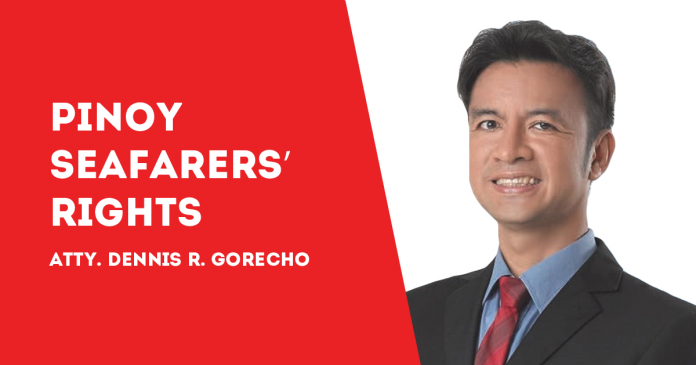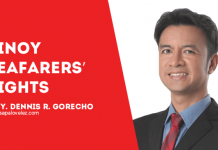
ANXIETY due to lack of proper information on the coronavirus disease 2019 (COVID-19) might be fatal for someone infected with the pandemic virus.
“I am a COVID-19 survivor and may God protect us all.”
This was the pronouncement made by Filipino seafarer Lourence Tan de Leon who was among the 149 recorded COVID-19 cases of infected crew on board the cruise Costa Atlantica.
Costa Atlantica was one of the over 40 cruise ships that had confirmed positive COVID-19 cases.
It was docked in Nagasaki, Japan from Feb. 20, 2020 where it was under repair. A positive case was first reported aboard on April 20, 2020. They have all been quarantined since then.
Costa Atlantica had 623 crew members of 36 different nationalities and no passengers at the time the first positive case was first reported. It had a capacity for 2,114 passengers.
“During the first three days that I’ve been isolated, no words from the doctor or any medical person explaining to me what to do. The silence at my cabin made me feel that I am alone. When I watched any film it made me cry for no reason at all. Those were the days I felt frustrated and I don’t even know how to tell this to my family,” De Leon said.
He noted that it is true that the virus can kill any weak person and will release symptoms in one’s body. The worst is if once your lungs are infected; one has to be intubated which is really not comfortable and easy.
Fortunately, his condition was considered a mild case only.
“Mild symptoms” have been compared to the flu or a cold ― fever, fatigue, dry cough, aches, chills, sore throat, runny nose and diarrhea.
De Leon realized that in cases COVID-19 per se will not kill a person , it might still be fatal because of anxiety due to lack of proper knowledge on the virus compounded by over-exaggerated reports.
He started to read every information from the internet that could help, including videos from Dr. Willie Ong. He added that the most powerful medicine is prayer.
The ship left Nagasaki port on May 31, 2020 with the latest affected cases count at 149.
De Leon arrived in the Philippines on June 5 and is now under the mandatory 14-day quarantine.
Heightened risk and rapid spread of the disease is inevitable with the nature of cruise ship, particularly due to its crowded semi-enclosed areas.
With one Filipino out of every four or five seafarers on board a ship (whether cargo or cruise), the largest population of crew members comes from the Philippines. There are over 375,000 deployed Filipino seafarers that contribute an estimated $6.14 billion as remittances in 2018.
In an online signature campaign at Change.Org, Migrante International is calling for the full protection of the rights and welfare of all stranded and repatriated Filipino seafarers during the COVID-19 pandemic.
One of their demands is that timely psycho-social counselling and intervention be given to stressed and distressed seafarers onboard and upon arrival due to any trauma and anxiety caused by the lockdown and the pandemic.
Pandemic anxiety can be overwhelming which, if not handled properly, may become emotional, physical and economic catastrophes.
Fear of the unknown and uncertainty of their future is compounded by the repeated COVID-19 outbreaks on ships, the anxiety of contracting the virus and the company’s inability to provide them adequate protection and reliable information.
They also had to deal with financial issues, like the alteration or non-payment of their contractual monetary benefits, especially those with expired employment contracts who have been forced into continued labor aboard ships.
The group urged the immediate and prompt payment by the manning agencies and shipowners of the earned wages, hazard pay, unpaid allotments, termination pay, leave pay and medical benefits of seafarers.
The group likewise called for the immediate release of the promised one-time US$200 or P10,000 cash assistance from the DOLE-AKAP program to all seafarers who are in need. The release should be fast, and without any red tape and unrealistic requirements that cannot be produced due to the lockdown.
Frustrations grew as seafarers tried exasperatedly to avail themselves of the cash assistance due to the stringent requirements imposed and which many of them found redundant, tedious and impractical.
They added that there should be effective government intervention and information campaign to prevent all acts of discrimination against OFWs, both land-based and sea-based.
Fear and anxiety about the disease can lead to social stigma toward these seafarers. Some of the manifestations of stigma are social avoidance or rejection, physical violence and denials of health care, housing or employment.
***
Atty. Dennis R. Gorecho heads the seafarers’ division of the Sapalo Velez Bundang Bulilan law offices. For comments, send email at info@sapalovelez.com, or call 09175025808 or 09088665786./PN






